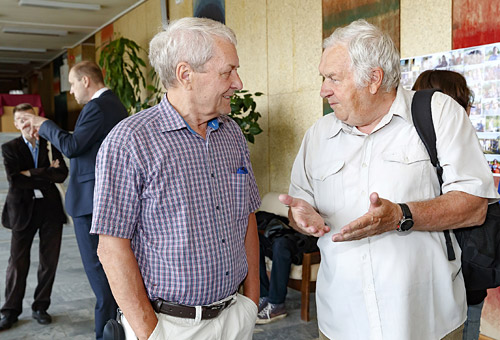
Electronic english version since 2022 |
The newspaper was founded in November 1957
| |
Projects of the XXI century
The significance of the conference is always high
Beginning at No. 28 of 27 July
Professor A.V.Bogdanov (St. Petersburg State University) (right) made a report "Mathematics as an engine for computational sciences" at the GRID'23 Conference:

"In short, my report is about the following. Informatics is such a developing science that cannot exist without mathematics. But it doesn't need all of classical mathematics, it needs approaches so that you can compactly add up several sections of classical mathematics and create an object that would be understandable to students and somehow learn how to use it. The most striking thing is that putting several classical objects together is beneficial not only for research, but also for learning. We are categorically short of hours and at the same time we teach students classical mathematics of the 19th century. When computer science students have to deal with algebra, topology and especially functional analysis, they simply stop dealing with it.
Students are students and the participants of the Conference are clearly interested in your report.
- I can say so. I am a pure mathematician and have long decided for myself that whatever I write, it is considered for 5-10 people in this world. Unfortunately, most of them have already died. The level in modern mathematics is very low. I go to conferences, give lectures, here it was an appeal not to mathematicians, but to computer scientists. If I started talking about my research in mathematics, no one here would understand me. But since everyone here knows about Feynman, about quantum computers too, it somehow was interesting.
Students should get the necessary basic knowledge and the specialization gets deeper, it needs to be combined somehow.
- You know, despite the overload, I undertook to read philosophy of mathematics or mathematical philosophy to students. I don't know what will come of it, but it interests them much more than my lectures on mathematics.
 Professor V.E.Velikhov (NRC "Kurchatov Institute") spoke about data-intensive scientific computing:
Professor V.E.Velikhov (NRC "Kurchatov Institute") spoke about data-intensive scientific computing:
"I think that today a very interesting moment has come when we have started to widely implement the things that we developed within the framework of CERN in our experiments. This is the most interesting part of our current work: together with MLIT, together with other institutes, we have finally reached our own facilities. One of the challenges that we faced while building the Tier1 centre was to completely master all the technologies in order to then completely automate our own facilities and efficiently process their data in a large network. Today, we have come to it that is clearly seen from the reports at the Conference. We need to make our own grid from the segment of the global network of the collider for intensive operations with data both for high-energy physics projects and for synchrotron-neutron research - a large Federal scientific and technical programme currently develops. For this grid, we need to do not just a technological part, but also to develop a scientific collaboration. This is one of the most important components, within the framework of which algorithms, programmes and techniques are developed, everything that we participated in, in collaboration with CERN, that we need to implement here and now. Here it is important to involve universities that are currently less involved in this work. Universities are personnel and the fact that they have invested a lot in recent years, it is time to start working off."
Professor S.E.Shirmovsky (Far Eastern Federal University, Vladivostok):
"Our university has had ties with Dubna for a very long time, probably for 50 years. At first, we collaborated with BLTP, I wrote my diploma here, defended my Ph.D., worked as a trainee researcher. Dubna is the place where I learned to do science. There are a lot of employees from Vladivostok, about 15 people. And I returned to Vladivostok, but currently, very successful cooperation with LRB develops at the level of theoretical physics. Our ties are not only very old but I believe, very promising. I made a report at the Conference, as did my colleagues from LRB Alexey Chizhov and Alexander Bugay. We have achieved, I think, very interesting work on quantum biophysics that we have reported here, there are interesting results and we will continue it. The prospects for cooperation are very good."

Sergey Shirmovsky and Alexey Chizhov
Presentations of the presented reports and photographic materials are posted on the Conference website grid2023.jinr.ru.
Olga TARANTINA,
photo by Elena PUZYNINA